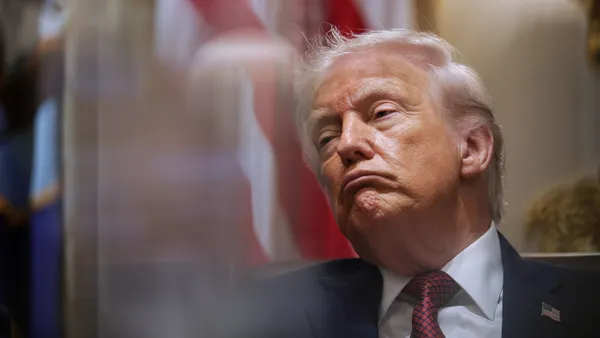Dive Brief:
- Renegotiation of the North American Free Trade Agreement (NAFTA) will not begin until May at the earliest, the Mexican government said this week, according to a Reuters report.
- As a prerequisite of negotiations, the government will begin consultations with industry leaders this month, to last 90 days. At that point, the country will be prepared to begin new negotiation talks.
- Mexican Economy Minister Ildefonso Guajardo, who met with trade officials at the White House in January, reportedly told Mexican radio a top topic of negotiation would be the treaty's rules of origin, which govern how a globally-transformed product's "origin" is treated, for the purpose of tariffs (among other reasons).
Dive Insight:
Several weeks into President Donald Trump's administration, the processes and issues that will frame the conversation of a NAFTA renegotiation are beginning to come to light.
The renegotiation of NAFTA has the potential to bring a sea change for the region's businesses, many of whose supply chains have come to rely upon free trade in North America for production. For that reason, both the U.S. and Mexico are looking, as is traditionally done, to consult stakeholders and identify areas of concern and improvement within the treaty. Both countries must conclude this process before engaging in talks, and trade talks usually include various rounds of such processes, reason for which negotiations can last for years.
Yet, while Mexico's engages in its 90-day consultation period, the U.S. has yet to move on its own internal process, although the President made various announcements Thursday signaling the nation is anxious to begin. But when will the U.S.' consultations and trade priorities be made clear?
According to the Trade Promotion Authority, the President must present written notification to Congress about his intention to enter negotiations, a move which had yet to occur as of Friday morning. Sixty days from that written notification, the U.S. Trade Representative's website will be updated to make public the negotiators' specific priorities.
In other words, the clock is ticking on the U.S., and executives should be on the lookout for when a letter of intent is provided to Congress. Much can change, specially with rules of origin on the line, and the consultation period will be pivotal to the negotiations. Regardless, companies can rest assured that nothing of impact will (likely) occur until at least May and longer if the U.S. continues to delay its own process.














